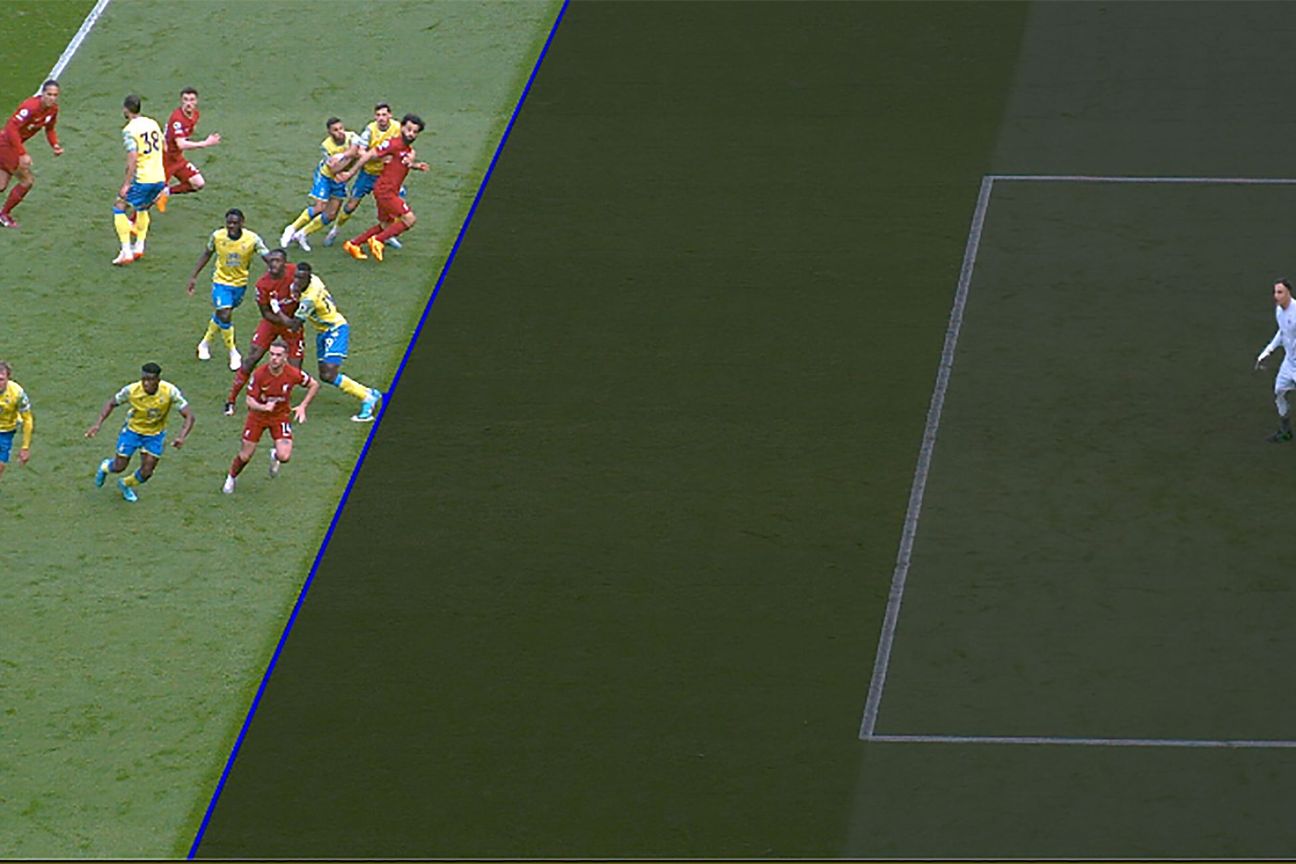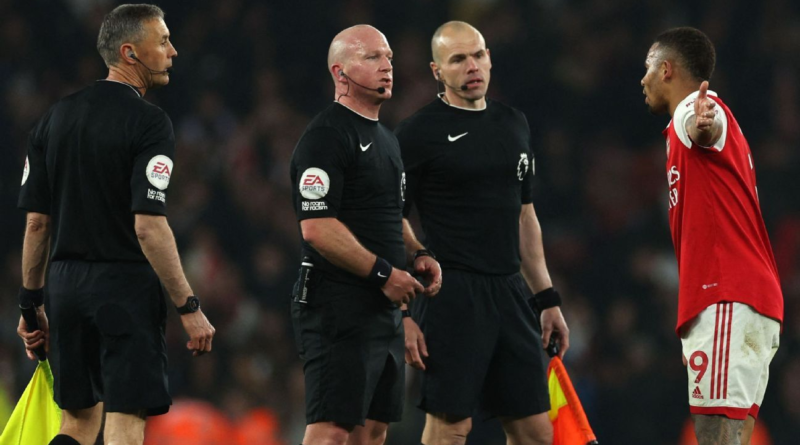The VAR Review: Jesus penalties for Arsenal, Faes handball claim
Video Assistant Referee causes controversy every week in the Premier League, but how are decisions made, and are they correct?
After each weekend we take a look at the major incidents, to examine and explain the process both in terms of VAR protocol and the Laws of the Game.
– How VAR decisions affected every Prem club in 2022-23
– VAR in the Premier League: Ultimate guide
In this week’s VAR Review: Could Arsenal have been awarded an injury-time penalty in their draw at home to Southampton? Did Leicester City‘s Wout Faes commit a handball offence against Wolves? And what about Liverpool‘s winner against Nottingham Forest?
Possible penalty: Bella-Kotchap on Jesus
What happened: In the 94th minute, Gabriel Jesus picked up a loose ball in the area and checked inside before going to ground when he went past Armel Bella-Kotchap. Play continued and Reiss Nelson saw a shot deflected wide of the post, but Jesus stayed on the floor asking for a penalty. Referee Simon Hooper waved away the appeal and pointed for a corner.
VAR decision: No penalty.
VAR review: From the replays, it’s difficult to see that there was any contact on Jesus by Bella-Kotchap, and it seemed as though the Arsenal striker may have gone to ground after taking a heavy touch inside toward two Southampton defenders.
There’s nothing in this to suggest the VAR, Peter Bankes, should have intervened to award a spot kick.
Possible penalty: Elyounoussi on Jesus / handball by Diallo
What happened: In the 100th minute, Ben White helped the ball back into the centre of the area, a Southampton defender nodded it away and it fell to Jesus, who was challenged by Mohamed Elyounoussi. Again, Jesus went to the turf looking for a penalty, and Bella-Kotchap then blasted the ball against the arm of teammate Ibrahima Diallo.
VAR decision: No penalty.
VAR review: This was similar to the first one. It’s not clear how much contact there was from the replays, but the striker absolutely went to ground in a theatrical manner, and there was nothing to suggest the VAR should have intervened.
The second claim was for handball against Diallo. It was powerfully struck at the Southampton player from point-blank range, and there is an exemption clause in guidance issued to referees when the ball is unexpectedly struck at a player by a teammate — even if the arm is away from the body. In any case, Diallo didn’t even have his arm extended, so there was no chance of a VAR intervention.
This handball claim isn’t comparable to the penalty West Ham United‘s Michail Antonio conceded against Arsenal last weekend; in that situation, the arm was away from the body and created a clear barrier for a shot on goal.
Possible penalty: Handball by Faes
What happened: Wolverhampton Wanderers had a corner in the 89th minute, and when the ball was floated in it seemed like it might have hit the outstretched arm of Wout Faes. There was a VAR check for a handball penalty.
VAR decision: No penalty.
VAR review: It’s a strange situation, because none of the available TV angles are truly conclusive of what happened. Did the ball strike the arm of Faes, or did it actually come off the back of Wolves’ Craig Dawson? The probability is it was off the Leicester player, but it’s not conclusive.
The handball offence would certainly be a penalty in UEFA competition (if confirmed as hitting the defender’s arm), but as we have seen many times the interpretation in continental competition is far stricter than in any domestic league. If the arm is away from the body in Europe, it’s going to be a penalty. The arm was out, but just how much Faes knew it was going to hit his arm is questionable as he missed an attempted header.
There is probably no way the VAR, Chris Kavanagh, could overrule the on-field decision from the available evidence.
It’s different to the penalty claim last weekend against Harry Maguire, when the Manchester United defender was jostling for position against other players and always had his arm in the same position.
If this spot kick is given by referee Andy Madley it wouldn’t have been overturned, as the evidence isn’t present either way, but it probably doesn’t quite reach the threshold for a VAR intervention.
Possible offside: Henderson and Salah on goal
What happened: Liverpool scored what proved to be the winning goal in the 70th minute when Mohamed Salah netted from Trent Alexander-Arnold‘s free kick. But was there an offside against Salah, or Jordan Henderson interfering with an opponent by trying to head it as the ball came across?
VAR decision: Goal stands.
VAR review: There would be a clear case for an offside offence against Henderson, because he made an obvious action to play the ball with at attempted flicked header.
From the regular TV angle it looked like Henderson, and in fact Salah, could have been in front of the last defender. But the offside technology clearly showed both were played well onside by the boots of Moussa Niakhate.

Possible penalty overturn: Jebbison foul on Silva
What happened: Daniel Jebbison tripped Bernardo Silva in the 41st minute, and referee Stuart Attwell pointed to the spot. The VAR, Tony Harrington, checked for a possible overturn.
VAR decision: Penalty stands, scored by Riyad Mahrez.
VAR review: The only question over the decision was whether Jebbison got a touch on the ball. Replays suggested it was Silva who got a toe to the ball, before the Sheffield United player then kicked the Manchester City player’s foot.
No chance this decision would be overturned, and the VAR would likely have intervened had the spot kick not been awarded.
Possible back-pass: Ream to Leno
What happened: In the 20th minute, Tim Ream played a pass back to goalkeeper Bernd Leno, who picked the ball up. However, referee Peter Bankes chose not to award an indirect free kick to Leeds inside the area.
VAR review: Not one for VAR, as the incident didn’t involve a possible penalty, but one worth discussing nonetheless.
When Ream plays the ball to the goalkeeper, it seems a certain back pass, but none of the Leeds players appeal for it. When the ball is picked up, Bankes clearly makes the signal that the assistant has told him the ball deflected off the outstretched boot of Leeds United‘s Rodrigo.
As soon as the ball comes off an opponent, this resets a possible back-pass offence.
Information provided by the Premier League and PGMOL was used in this story.




